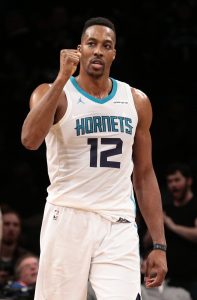After yo-yoing back and forth between the postseason and the lottery during Steve Clifford‘s first four years with the club, the Hornets failed to bounce back in Clifford’s fifth year, enduring a second straight 36-46 season. That disappointing outcome resulted in the ouster of both Clifford and GM Rich Cho, so Charlotte will head into the 2018/19 league year with a new management team and head coach in place as the club mulls its next moves.
Here’s where things currently stand for the Hornets financially, as we continue our Offseason Salary Cap Digest series for 2018:
Guaranteed Salary
- Nicolas Batum ($24,000,000)
- Dwight Howard ($23,819,725)
- Marvin Williams ($14,087,500)
- Cody Zeller ($13,528,090)
- Michael Kidd-Gilchrist ($13,000,000)
- Kemba Walker ($12,000,000)
- Jeremy Lamb ($7,488,372)
- Frank Kaminsky ($3,627,842)
- Malik Monk ($3,447,480)
- Willy Hernangomez ($1,544,951)
- Dwayne Bacon ($1,378,242)
- Total: $117,922,202
Player Options
- None
Team Options
- None
Non-Guaranteed Salary
- Julyan Stone ($1,656,092)1
- Total: $1,656,092
Restricted Free Agents
- Treveon Graham ($1,699,698 qualifying offer / $1,699,698 cap hold): Early Bird rights
- Total: $1,699,698
Unrestricted Free Agents / Other Cap Holds
- No. 11 overall pick ($3,346,518)2
- Michael Carter-Williams ($3,240,000): Non-Bird rights
- Total: $6,586,518
Projected Salary Cap: $101,000,000
Projected Cap Room: None
- With 11 of their 14 current players still on guaranteed contracts next year, the Hornets don’t have a whole lot of flexibility. Adding those 11 salaries to the team’s cap hold for its lottery pick works out to a total team salary of $121,268,720, which is well above the cap and may be right around the tax line. While new GM Mitch Kupchak will almost certainly look to reduce that figure this summer, creating any short-term cap room is unlikely.
Footnotes:
- Stone’s salary becomes fully guaranteed after August 1.
- The Hornets are 11th in the draft lottery standings. They’ll likely have the No. 11 selection, but could end up picking as high as No. 1 ($8,095,595) and as low as No. 14 ($2,869,353).
Note: Rookie scale cap holds are estimates based on salary cap projections and could increase or decrease depending on where the cap lands.
Salary information from Basketball Insiders was used in the creation of this post. Photo courtesy of USA Today Sports Images.